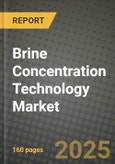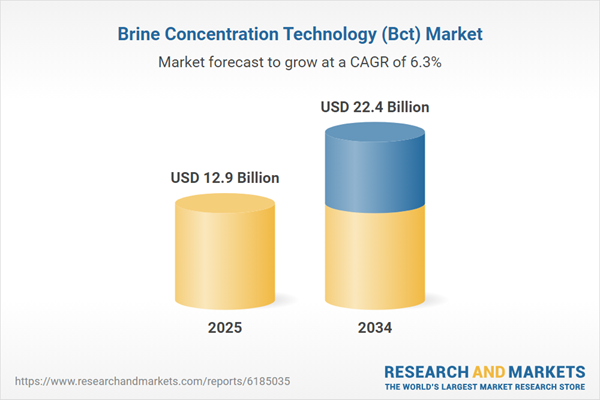The brine concentration technology (BCT) market is a specialized segment within the water treatment industry, focused on managing and reducing high-salinity wastewater produced by industries such as oil and gas, mining, power generation, and desalination. BCT solutions aim to recover valuable resources, minimize environmental impact, and achieve zero liquid discharge (ZLD) objectives by concentrating brine to high levels, reducing the volume of waste that must be disposed of. As regulatory pressures tighten and industries seek more sustainable practices, the demand for effective brine concentration technologies continues to grow.
Recent advancements in BCT have resulted in more efficient and cost-effective solutions. Technologies such as mechanical vapor recompression (MVR), multi-effect distillation (MED), and advanced membrane systems have improved energy efficiency, lowered operational costs, and increased recovery rates. Additionally, innovations in material science and process optimization are making these technologies more robust, scalable, and suitable for a wider range of industrial applications. These developments not only help companies meet environmental regulations but also offer economic benefits by recovering valuable byproducts such as minerals and salts.
Regionally, North America and Europe lead the market due to strict environmental regulations, advanced industrial infrastructure, and greater awareness of sustainable practices. However, the Asia-Pacific region is emerging as a significant growth area, driven by rapid industrialization, increasing water scarcity, and government initiatives promoting sustainable water management. As industries worldwide strive to reduce their environmental footprint and improve resource recovery, the BCT market is expected to experience steady growth, supported by technological innovations and a global push for more sustainable water treatment solutions.
Key Insights: Brine Concentration Technology (Bct) Market
Increasing Adoption of Zero Liquid Discharge (ZLD) Solutions: ZLD has become a prominent goal for many industries seeking to eliminate wastewater discharge. Brine concentration technologies are a crucial component of ZLD systems, helping companies recover water and valuable resources while complying with environmental regulations.Advancements in Energy-Efficient Technologies: The development of energy-efficient processes, such as mechanical vapor recompression and advanced thermal systems, is reducing operational costs and making brine concentration more economically viable. These improvements support wider adoption across various industries.
Growing Use of Membrane-Based Technologies: Membrane systems, including reverse osmosis and forward osmosis, are gaining traction due to their scalability, lower energy requirements, and ability to handle complex brine streams. These technologies are increasingly being integrated into BCT solutions to enhance performance and reduce costs.
Stricter Environmental Regulations: Governments and regulatory bodies are implementing more stringent wastewater discharge limits, driving demand for brine concentration technologies that help industries meet compliance standards while minimizing their environmental impact.
Rising Water Scarcity and Resource Recovery Needs: As water scarcity becomes a growing global concern, industries are investing in technologies that maximize water reuse and recover valuable byproducts from brine. This trend supports the adoption of advanced brine concentration solutions.
Increased Industrialization and Desalination Projects: The expansion of industries that generate high-salinity waste streams, coupled with the growth of desalination facilities, has created a larger market for brine concentration technologies. These solutions address the unique challenges of managing and treating highly saline effluents.
High Initial Investment and Operational Costs: Although advancements are reducing costs, brine concentration technologies remain capital-intensive. High upfront investment and ongoing operational expenses can deter adoption, especially for smaller enterprises or regions with limited financial resources.
Complexity in Treating Diverse Brine Streams: Different industries produce brines with varying compositions, making it challenging to develop a one-size-fits-all solution. Customizing technologies to handle specific brine chemistries adds complexity and cost to implementation.
Energy Demand and Environmental Trade-Offs: While energy-efficient technologies are emerging, the energy-intensive nature of some brine concentration processes can still contribute to higher carbon emissions. Balancing energy consumption with environmental benefits remains a key challenge in the market.
Brine Concentration Technology (Bct) Market Segmentation
By Technology
- High Energy Reverse Osmosis
- Mechanical Vapor Compression
- Closed Circuit Desalination
- Vertical Tube Falling Film
- Other Technologies
By Type
- Calcium Chloride
- Sodium Chloride
- Zinc Calcium Bromide
- Cesium Formate
- Potassium Chloride
- Other Types
By End User
- Coal To Chemicals
- Food and Beverage
- Mining
- Oil and Gas
- Pulp and Paper
- Steel
- Power
- Textile
- Refining and Petrochemicals
- Other End Users
Key Companies Analysed
- Veolia Environnement S.A.
- Dow Inc.
- DuPont de Nemours Inc.
- SUEZ Group
- Tetra Technologies Inc.
- Pall Corporation
- Evoqua Water Technologies Corp
- Hyflux Ltd.
- H2O Innovations Inc.
- Aquatech International LLC
- IDE Technologies Ltd.
- Koch Separation Solutions Inc.
- Saltworks Technologies Inc.
- Synder Filtration Inc.
- Samco Technologies Inc.
- AquaChem Inc.
- Gradiant India Pvt Ltd.
- Oasys Water Inc.
- Lenntech B.V.
- AquaChemie Chemicals Trading LLC
- Advent Envirocare Technology Pvt. Ltd
- Duraflow LLC
- Rosenblad Design Group Inc.
- Modern Water plc
- Enviro Water Minerals Company Inc.
Brine Concentration Technology (Bct) Market Analytics
The report employs rigorous tools, including Porter’s Five Forces, value chain mapping, and scenario-based modeling, to assess supply-demand dynamics. Cross-sector influences from parent, derived, and substitute markets are evaluated to identify risks and opportunities. Trade and pricing analytics provide an up-to-date view of international flows, including leading exporters, importers, and regional price trends.Macroeconomic indicators, policy frameworks such as carbon pricing and energy security strategies, and evolving consumer behavior are considered in forecasting scenarios. Recent deal flows, partnerships, and technology innovations are incorporated to assess their impact on future market performance.
Brine Concentration Technology (Bct) Market Competitive Intelligence
The competitive landscape is mapped through proprietary frameworks, profiling leading companies with details on business models, product portfolios, financial performance, and strategic initiatives. Key developments such as mergers & acquisitions, technology collaborations, investment inflows, and regional expansions are analyzed for their competitive impact. The report also identifies emerging players and innovative startups contributing to market disruption.Regional insights highlight the most promising investment destinations, regulatory landscapes, and evolving partnerships across energy and industrial corridors.
Countries Covered
- North America - Brine Concentration Technology (Bct) market data and outlook to 2034
- United States
- Canada
- Mexico
- Europe - Brine Concentration Technology (Bct) market data and outlook to 2034
- Germany
- United Kingdom
- France
- Italy
- Spain
- BeNeLux
- Russia
- Sweden
- Asia-Pacific - Brine Concentration Technology (Bct) market data and outlook to 2034
- China
- Japan
- India
- South Korea
- Australia
- Indonesia
- Malaysia
- Vietnam
- Middle East and Africa - Brine Concentration Technology (Bct) market data and outlook to 2034
- Saudi Arabia
- South Africa
- Iran
- UAE
- Egypt
- South and Central America - Brine Concentration Technology (Bct) market data and outlook to 2034
- Brazil
- Argentina
- Chile
- Peru
Research Methodology
This study combines primary inputs from industry experts across the Brine Concentration Technology (Bct) value chain with secondary data from associations, government publications, trade databases, and company disclosures. Proprietary modeling techniques, including data triangulation, statistical correlation, and scenario planning, are applied to deliver reliable market sizing and forecasting.Key Questions Addressed
- What is the current and forecast market size of the Brine Concentration Technology (Bct) industry at global, regional, and country levels?
- Which types, applications, and technologies present the highest growth potential?
- How are supply chains adapting to geopolitical and economic shocks?
- What role do policy frameworks, trade flows, and sustainability targets play in shaping demand?
- Who are the leading players, and how are their strategies evolving in the face of global uncertainty?
- Which regional “hotspots” and customer segments will outpace the market, and what go-to-market and partnership models best support entry and expansion?
- Where are the most investable opportunities - across technology roadmaps, sustainability-linked innovation, and M&A - and what is the best segment to invest over the next 3-5 years?
Your Key Takeaways from the Brine Concentration Technology (Bct) Market Report
- Global Brine Concentration Technology (Bct) market size and growth projections (CAGR), 2024-2034
- Impact of Russia-Ukraine, Israel-Palestine, and Hamas conflicts on Brine Concentration Technology (Bct) trade, costs, and supply chains
- Brine Concentration Technology (Bct) market size, share, and outlook across 5 regions and 27 countries, 2023-2034
- Brine Concentration Technology (Bct) market size, CAGR, and market share of key products, applications, and end-user verticals, 2023-2034
- Short- and long-term Brine Concentration Technology (Bct) market trends, drivers, restraints, and opportunities
- Porter’s Five Forces analysis, technological developments, and Brine Concentration Technology (Bct) supply chain analysis
- Brine Concentration Technology (Bct) trade analysis, Brine Concentration Technology (Bct) market price analysis, and Brine Concentration Technology (Bct) supply/demand dynamics
- Profiles of 5 leading companies - overview, key strategies, financials, and products
- Latest Brine Concentration Technology (Bct) market news and developments
Additional Support
With the purchase of this report, you will receive:- An updated PDF report and an MS Excel data workbook containing all market tables and figures for easy analysis.
- 7-day post-sale analyst support for clarifications and in-scope supplementary data, ensuring the deliverable aligns precisely with your requirements.
- Complimentary report update to incorporate the latest available data and the impact of recent market developments.
This product will be delivered within 1-3 business days.
Table of Contents
Companies Mentioned
- Veolia Environnement S.A.
- Dow Inc.
- DuPont de Nemours Inc.
- SUEZ Group
- Tetra Technologies Inc.
- Pall Corporation
- Evoqua Water Technologies Corp
- Hyflux Ltd.
- H2O Innovations Inc.
- Aquatech International LLC
- IDE Technologies Ltd.
- Koch Separation Solutions Inc.
- Saltworks Technologies Inc.
- Synder Filtration Inc.
- Samco Technologies Inc.
- AquaChem Inc.
- Gradiant India Pvt Ltd.
- Oasys Water Inc.
- Lenntech B.V.
- AquaChemie Chemicals Trading LLC
- Advent Envirocare Technology Pvt. Ltd.
- Duraflow LLC
- Rosenblad Design Group Inc.
- Modern Water PLC
- Enviro Water Minerals Company Inc.
Table Information
| Report Attribute | Details |
|---|---|
| No. of Pages | 160 |
| Published | October 2025 |
| Forecast Period | 2025 - 2034 |
| Estimated Market Value ( USD | $ 12.9 Billion |
| Forecasted Market Value ( USD | $ 22.4 Billion |
| Compound Annual Growth Rate | 6.3% |
| Regions Covered | Global |
| No. of Companies Mentioned | 25 |









